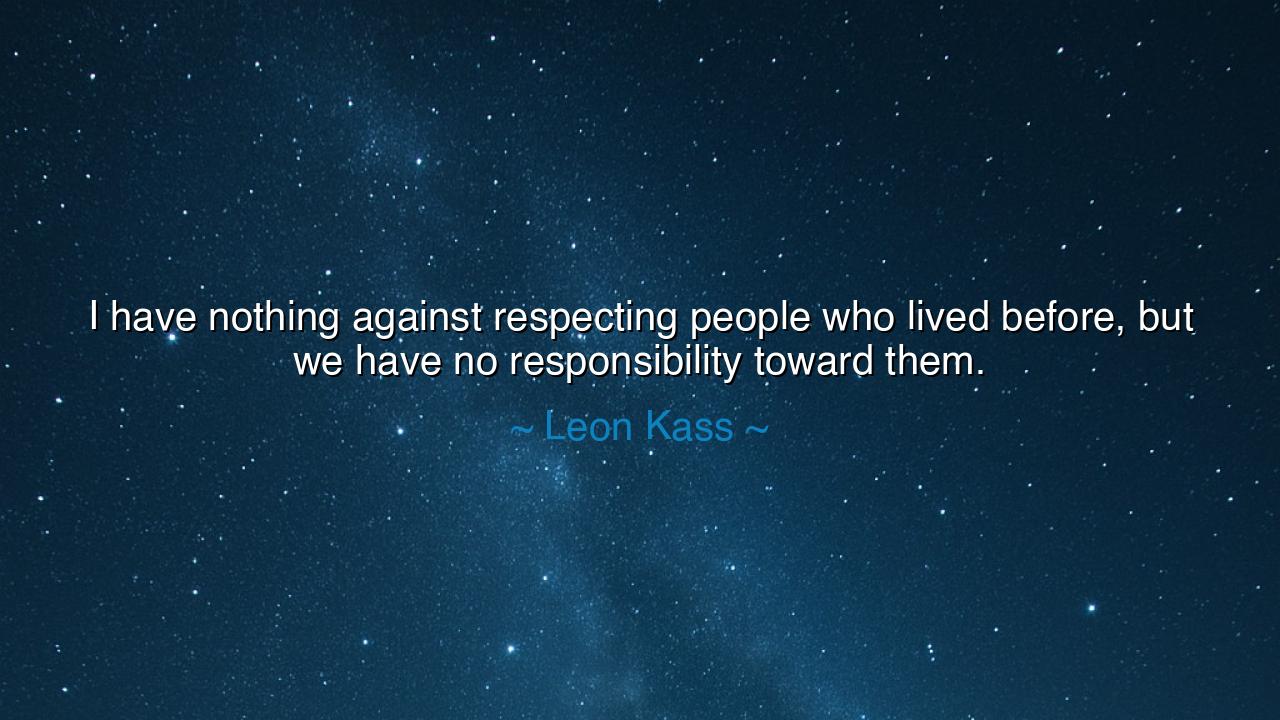
I have nothing against respecting people who lived before, but we
I have nothing against respecting people who lived before, but we have no responsibility toward them.






The words of Leon Kass, “I have nothing against respecting people who lived before, but we have no responsibility toward them,” pierce like a double-edged blade through the heart of tradition. It is not spoken to mock the ancestors, nor to deny their wisdom, but to remind us of a sobering truth: the dead do not bind the living with chains of duty. The ancients gave us their stories, their laws, their ways of life—but they themselves are gone, beyond need, beyond desire, beyond claim. Respect may be offered like incense at the altar, yet obligation rests only upon the shoulders of the living.
To understand this saying, one must see the gulf between respect and responsibility. Respect is a gesture of honor, a recognition of those who walked before us, who built roads we now tread. But responsibility is a debt, a weight carried forward, a binding tie that commands action. The quote reminds us that we owe reverence to the past, but not submission. The living must craft their world not as servants of the dead, but as stewards of the present and guardians of the future.
History itself testifies to this truth. Think of the French Revolution, when the people cast aside the ancient monarchy that had ruled for centuries. They respected the grandeur of their nation’s past, but they refused to be shackled by a throne and crown that had drained them of life. They understood that the kings of yesterday could no longer demand obedience from the hungry of today. Out of blood and fire arose a new cry: liberty, equality, fraternity. It was not a denial of history, but a refusal to let the dead hand of tradition hold the living in chains.
And yet, there is danger in misunderstanding Kass’s words. To have no responsibility toward the dead does not mean we are free to forget them entirely, nor to mock their legacy. For the memory of the ancestors holds wisdom, warnings, and examples. The Romans revered their mos maiorum, the customs of the forefathers, not because they were bound to obey them, but because such memory was a lantern against folly. Respect keeps us humble before the lessons of time, while freedom releases us from blind servitude.
The essence of the teaching, then, is balance. We honor the ancestors with respect, but we do not chain ourselves to their errors. We remember their courage, their sacrifice, their art, but we are not obliged to preserve their mistakes. Just as the child must one day step beyond the shadow of the parent to live his own life, so must humanity step beyond the shadow of the past to craft its own destiny. The ancestors are gone; it is the living and the unborn who must command our greatest responsibility.
Therefore, let this be the lesson: give the past its due honor, but devote your true strength to the present and the future. Ask yourself not, “What would my ancestors have me do?” but rather, “What is needed now, and what legacy shall I leave for those to come?” For the dead have no need of bread, but the living hunger. The dead have no need of justice, but the children yet unborn cry out for it. Our responsibility is not backward, but forward, toward those whose lives are yet unfolding.
In practice, this means: study history, but do not be enslaved by it. Respect your traditions, but question them. Honor the sacrifices of those before you, but never let their shadows dim your vision of what must yet be created. Build schools, heal wounds, protect the earth, and leave behind works that your children’s children may bless. In this way, you respect the dead not by obeying them, but by ensuring their struggles were not in vain, for their lives prepared the ground upon which you now stand.
Thus, the words of Leon Kass rise not as a rejection of the past, but as a call to courage in the present. Respect the ancestors, but bear no responsibility toward them. Give them memory, but give the living your labor. And above all, fix your eyes upon the horizon of the future, for it is there that your true duty lies.






AAdministratorAdministrator
Welcome, honored guests. Please leave a comment, we will respond soon